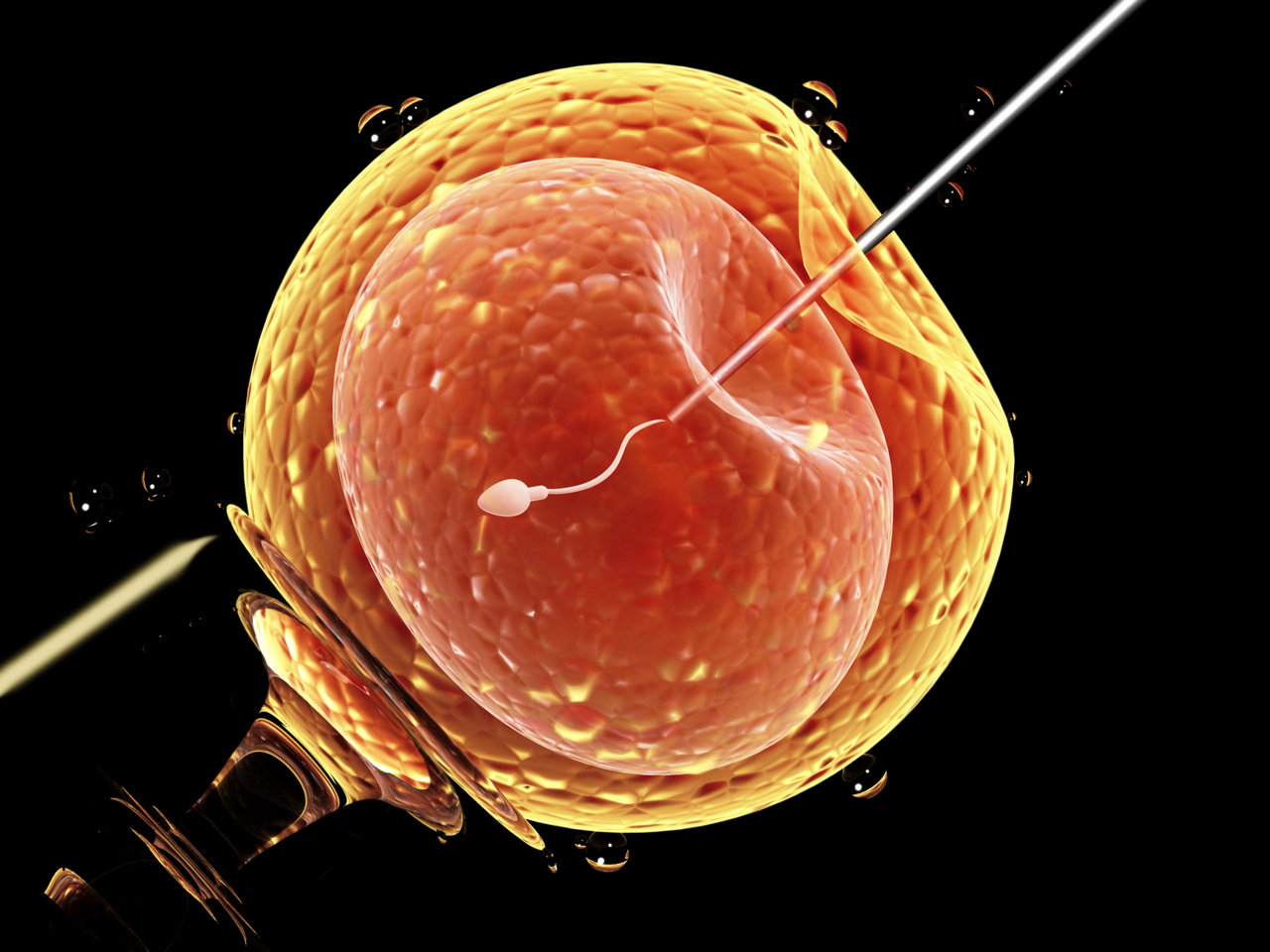ICSI Intracytoplasmic Sperm Injection
What is ICSI and How Does it Differ from Traditional IVF?
Intracytoplasmic Sperm Injection (ICSI) is a specialized technique used in conjunction with IVF to assist fertilization in cases where a male's sperm cannot naturally penetrate the egg. In ICSI, a single sperm is directly injected into the cytoplasm of an egg using a fine needle, bypassing many of the natural barriers that sperm typically encounter during natural fertilization or conventional IVF.

The Process of ICSI
The process involves several key steps:
- Ovarian Stimulation and Egg Retrieval: As with traditional IVF, the woman undergoes ovarian stimulation to produce multiple eggs. These eggs are then retrieved from the ovaries.
- Sperm Collection: Sperm is obtained from the male partner or a donor. In situations where sperm production is significantly impaired, it may be surgically retrieved directly from the testes using procedures such as Testicular Sperm Aspiration (TESA).
- Sperm Injection: Instead of allowing the sperm to fertilize the egg in a petri dish, as in conventional IVF, an embryologist selects a single healthy sperm and injects it directly into the egg using a microscopic needle.
- Embryo Cultivation: Once the egg is fertilized, it is monitored as it develops into an embryo. After a few days, the embryo is ready to be transferred into the woman's uterus or frozen for future use.
ICSI is particularly beneficial in cases where infertility issues in men are present, such as low sperm count, poor sperm motility, or abnormal sperm morphology. By directly injecting the sperm into the egg, it bypasses the natural fertilization process that these factors might otherwise hinder.
Free Online Consultation with Dr Thanos Paraschos and his team
Comparing ICSI to Conventional IVF Techniques
While both ICSI and traditional IVF share many similarities in their overall process, there are significant differences in how fertilization occurs. In conventional IVF, eggs and sperm are combined in a laboratory setting, and fertilization occurs naturally in a petri dish if the sperm is able to penetrate the egg.
Key Differences
- Fertilization Method:
- In IVF, sperm and eggs are placed together in a culture dish, where fertilization happens spontaneously if the sperm can swim and penetrate the egg.
- In ICSI, a single sperm is manually injected into the egg, bypassing the natural fertilization process.

- Male Fertility Factor :
- IVF is generally used when both the male and female partners have normal or mild fertility issues. The sperm must be able to penetrate the egg on its own.
- ICSI is used when there are significant male fertility factors, such as low sperm count or poor sperm quality, which might prevent natural fertilization.
- Fertilization Success Rates:
- ICSI has a higher fertilization success rate in cases of infertility issues in men. Studies indicate that it results in fertilization rates of approximately 70–85%, depending on the quality of the eggs and sperm cells.
- In conventional IVF, fertilization rates are typically lower when male factors are the cause of infertility.
- Embryo Development:
- Once fertilization occurs, both techniques follow a similar path, with embryo development and transfer being the next steps.
When is ICSI Recommended Over Standard IVF?
Intracytoplasmic Sperm Injection is not always the first choice for couples undergoing fertility treatments, but there are specific scenarios in which it becomes the preferred option. Understanding when it is recommended to use ICSI can help patients make informed decisions about their treatment plan.
- Male Factor Infertility:
- ICSI is most commonly recommended when infertility in men is a significant factor. This includes severe cases of oligospermia (low sperm count), asthenozoospermia (poor sperm motility), teratozoospermia (abnormal sperm shape), or cases where sperm are unable to penetrate the egg naturally.
- In cases where no sperm is present in the ejaculate (azoospermia), sperm can be retrieved directly from the testes using procedures like TESA or Micro-TESE. Once retrieved, ICSI can be used to inject the sperm into the egg.
- Previous IVF Failures: If a couple has undergone IVF cycles that resulted in poor or no fertilization, ICSI may be recommended in subsequent cycles to increase the chances of fertilization. Sometimes, even when sperm and eggs appear normal, fertilization may not occur naturally due to unknown factors. Intracytoplasmic Sperm Injection provides a more controlled method.
- Unexplained Infertility: In cases of unexplained infertility where no clear cause has been identified, ICSI may be used as a fertility treatment option. The direct injection of sperm into the egg can help overcome undetected issues with sperm-egg interaction.
- Use of Frozen Sperm: When frozen sperm is used, particularly in cases where the sperm quality may have been affected by the freezing process, Intracytoplasmic Sperm Injection can improve fertilization rates by ensuring that the sperm is directly injected into the egg.
- Use of Donor Eggs or Donor Sperm: In cases involving donor eggs or donor sperm, it may be considered to maximize fertilization potential, especially if there are concerns about sperm quality.
- Preimplantation Genetic Testing (PGT): Couples choosing to undergo Preimplantation Genetic Testing (PGT) to screen embryos for genetic abnormalities often use Intracytoplasmic Sperm Injection to prevent contamination of the genetic material. Since only one sperm is injected into the egg, it reduces the risk of introducing extraneous sperm cells that could interfere with genetic testing.
Success Rates and Considerations
ICSI has proven to be a highly effective technique for overcoming male factor infertility, with fertilization rates often exceeding those of conventional IVF in cases where sperm issues are present.
However, it's important to note that while it can improve fertilization rates, it does not necessarily increase the chances of a successful pregnancy or live birth. The quality of the eggs and the overall health of the woman play a significant role in the outcome.
- ICSI Fertilization Rates:
- Use of ICSI is particularly effective in overcoming male factor infertility, with fertilization rates ranging from 70% to 85% in cases where sperm quality is compromised. This high fertilization rate is due to the direct injection of sperm into the egg, bypassing issues like poor motility or low sperm count.
- Even in cases of severe infertility in men, where sperm is surgically retrieved from the testes (e.g., through Testicular Sperm Aspiration or Micro-TESE), ICSI can result in successful fertilization.
- Traditional IVF Fertilization Rates:
- In traditional IVF, fertilization rates are typically lower when infertility issues in men are involved, falling between 50% to 70% depending on the quality of the sperm and eggs. If sperm motility or morphology is poor, the chances of successful in vitro fertilization are reduced, as the sperm may struggle to penetrate the egg.
- In cases where both partners have normal fertility parameters, the fertilization rates for traditional IVF and ICSI are similar. However, it is often preferred when there are concerns about sperm quality, as it provides a more controlled environment for fertilization.
ICSI Treatment in EmBIO IVF Center
The Embio IVF Center, located in Athens, Greece, is one of the leading fertility clinics in Europe, offering state-of-the-art treatments for infertility, including ICSI. The center is renowned for its high success rates, personalized treatment plans, and world-class laboratory facilities. At Embio, patients have access to the latest fertility technologies, highly trained embryologists, and compassionate care.
Intracytoplasmic Sperm Injection (ICSI) is a significant advancement in assisted reproductive technology, providing hope to many couples facing challenges in conceiving. By directly injecting sperm into the egg, it overcomes many obstacles related to sperm quality or function, increasing the chances of successful fertilization. When combined with In Vitro Fertilization , ICSI can greatly improve the likelihood of conception, especially in cases where traditional IVF has been unsuccessful.
With ICSI as one of their most frequently performed procedures, Embio has helped countless couples achieve successful pregnancies, even in cases of severe infertility in men. The clinic’s commitment to excellence is demonstrated through its blend of advanced scientific techniques and a patient-focused approach to care.

Bring your family dream to life
Patients from many different countries come to Embio IVF Center, Europe's premier fertility center well-known for our personal approach to every fertility treatment and our no-waiting-list policy.
Our team can provide you with superior care throughout your family-building journey, thanks to the fertility-friendly regulations in Greece and our highly selective donor databases.
What Should I Expect During an ICSI Cycle at EmBIO Fertility Clinic?
Undergoing an ICSI (Intracytoplasmic Sperm Injection) cycle at a fertility clinic involves multiple stages, from initial consultations to post-procedure care. Understanding what to expect at each step can help patients feel more prepared and confident as they embark on their fertility journey.
Preparing for ICSI: Tests and Consultations
Before starting an ICSI cycle, both partners will go through a series of tests and consultations to assess their fertility and determine the best approach for treatment. These initial steps are crucial for developing a personalized treatment plan based on each couple's specific needs.
- Medical History and Fertility Assessment :
- Both partners will meet with a fertility specialist to review their medical history, including any previous fertility treatments, lifestyle factors, and any known fertility issues (eg, male factor infertility, ovulation problems, etc.).
- The woman will undergo a series of tests to assess her ovarian reserve (typically through blood tests such as Anti-Müllerian Hormone (AMH) levels and an antral follicle count via ultrasound). These tests help determine how many eggs she is likely to produce during the ICSI cycle.
- The man will undergo a semen analysis to assess sperm count, motility, and morphology. In cases of severe infertility in men, additional tests such as sperm DNA fragmentation or genetic testing may be performed.
- Counseling and Informed Consent :
- Most fertility clinics will offer counseling sessions to help the couple understand the emotional, physical, and financial aspects of undergoing ICSI. These sessions are designed to ensure that both partners are fully informed about the process, potential risks, and success rates.
- The couple will also be asked to provide informed consent, acknowledging that they understand the procedure and the potential outcomes.
- Pre-treatment Health Optimization :
- Couples may be advised to make certain lifestyle changes before starting the ICSI cycle. This could include optimizing diet, reducing stress, quitting smoking, and limiting alcohol intake, all of which can improve fertility outcomes.
- In some cases, pre-treatment medications or supplements (such as folic acid for the woman) may be recommended to prepare the body for treatment.
The ICSI Timeline: From Egg Retrieval to Embryo Transfer
The ICSI cycle follows a structured timeline, similar to traditional IVF, but with the added step of sperm injection into the egg when the sperm collection is performed. Read a detailed description of the IVF Procedure .
Previous IVF Failures: Is ICSI the Next Step?
Experiencing failed IVF cycles can be emotionally challenging for couples, raising questions about what went wrong and what steps to take next. In cases where previous IVF cycles have resulted in poor or no fertilization, ICSI is often recommended as the next step to increase the chances of success.
There are several reasons why IVF may fail, and some of these can be addressed through ICSI:
- Fertilization Failure: One of the most common reasons for IVF failure is failed fertilization, where the sperm fails to penetrate the egg. This can happen even when sperm parameters, such as count, motility, and morphology, appear normal. ICSI eliminates this potential issue by injecting the sperm directly into the egg.
- Low Fertilization Rates: In some IVF cycles, fertilization occurs, but at a much lower rate than expected. ICSI can improve fertilization rates in subsequent IVF cycles by ensuring that more eggs are successfully fertilized.
- Embryo Quality Issues: Poor embryo quality after fertilization is another reason for IVF failure. While ICSI does not directly address issues related to embryo development, it can help ensure that fertilization occurs, allowing for the selection of the best embryos for transfer.
- Unknown Sperm-Egg Interaction Problems: Even in cases where both partners have normal fertility test results, there may be unknown issues with how the sperm and egg interact that prevent successful fertilization. ICSI bypasses this by ensuring that fertilization occurs in a controlled environment.
For couples who have experienced multiple IVF failures, ICSI offers a more precise method of fertilization that can help overcome some of the factors that contributed to previous unsuccessful attempts. However, like all fertility treatments, ICSI is not a guarantee of success, and factors such as egg quality and the woman's age still play a significant role in the outcome.

Questions and Answers for ICSI
What additional tests are required for ICSI?
Additional sperm tests are commonly required for ICSI, including detailed semen analysis and sperm DNA fragmentation testing. In some cases, genetic testing may be recommended to check for chromosomal abnormalities or genetic conditions that could be passed on to offspring. Blood tests to assess hormone levels may also be needed.
Will all eggs be injected during ICSI?
Not necessarily. Only mature eggs can be injected with sperm during ICSI. On average, about 75-80% of retrieved eggs are mature enough to be injected.
Is genetic testing recommended before ICSI?
Genetic testing is recommended in certain cases before proceeding with ICSI, especially for men with very low sperm counts or absence of sperm in the ejaculate. This helps identify any genetic factors that could potentially be inherited by children.
How does ICSI affect embryo quality?
ICSI itself does not appear to negatively impact embryo quality compared to standard IVF. The fertilization rates and embryo development are generally similar between ICSI and conventional IVF when there are no male factor issues.
What happens if fertilization fails after ICSI?
If fertilization fails completely after ICSI, the cycle will be canceled. However, total fertilization failure is rare with ICSI, occurring in less than 5% of cases. Partial fertilization failure is more common, where some eggs fertilize but others do not.
Are there any age restrictions for ICSI treatment?
There are no specific age restrictions for ICSI treatment. However, as with IVF, success rates decline with increasing maternal age due to decreased egg quality and quantity. In Greece the age limit for IVF is 54 years with the legislation of 2022.
Can ICSI be used with frozen eggs or sperm?
Yes, ICSI can be used with both frozen eggs and frozen sperm. In fact, ICSI is typically required when using frozen eggs, as the freezing process can harden the outer shell of the egg, making it more difficult for sperm to penetrate naturally.
How long does the ICSI process take?
The entire ICSI cycle typically takes about 4-6 weeks from start to finish. This includes ovarian stimulation (10-12 days), egg retrieval, fertilization via ICSI, embryo culture (3-5 days), and embryo transfer. The actual ICSI procedure itself only takes a few hours in the laboratory.
What is the cost of ICSI?
At EmBIO, we believe that a patient's financial situation should not influence medical decisions. That's why all of our IVF treatments include ICSI at no additional cost. By providing this inclusive approach, we help eliminate any financial concerns, allowing our patients to fully concentrate on their fertility journey with confidence and peace of mind, knowing they are receiving the best possible care. Check the cost of our assisted reproduction treatments.
Are IVF ICSI babies healthy?
Yes, babies born through IVF and the direct injection of a single sperm cell into the egg, are generally as healthy as those conceived naturally! While there may be a slightly higher risk of certain complications, such as low birth weight or preterm birth, the vast majority of ICSI-conceived babies are born perfectly healthy.
Does ICSI increase the chance of autism?
The connection between ICSI and autism has been studied, and while some research suggests a slightly higher incidence of autism spectrum disorders (ASD) in children conceived through assisted reproductive technologies, this is not conclusive. Many factors, such as parental age and genetics, may play a larger role. Our experts will guide you through the latest research and provide personalized advice, giving you confidence and peace of mind throughout your fertility journey. Read more: Why ICSI and IVF are not responsible for Autism Spectrum Disorders (ASD)
Can ICSI cause chromosomal abnormalities?
While some concerns exist about chromosomal abnormalities due to the bypassing of natural selection in ICSI technique, the majority of ICSI-conceived children are born without chromosomal issues and other birth defects. At EmBIO IVF Center, we utilize advanced techniques such as Preimplantation Genetic Testing to screen embryos for chromosomal abnormalities before they are implanted, significantly reducing any potential risks. Our world-class laboratory and experienced embryologists are dedicated to ensuring the healthiest possible outcomes, giving you the best chance of a successful pregnancy and a healthy baby.
Can ICSI damage embryos?
It is a highly delicate procedure, and while there is a small potential for damaging the egg during the process, it is extremely rare when performed by experienced professionals. At EmBIO IVF Center, our team of highly trained embryologists is among the best in the field, using the latest technologies and techniques to perform ICSI with exceptional precision and care.
Read more: Embryo selection with time-lapse and artificial intelligence
Do babies look like their parents?
Absolutely! Babies born through ICSI inherit the same genetic material from their parents as naturally conceived babies, so they have every chance of looking just like their mom and dad. The injection of sperm into an egg does not alter the genetic information passed down from the parents.

